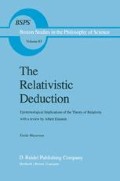Abstract
If we now turn to the strictly scientific aspect of the theory, the first thing we notice is that, in reducing reality to space, the relativistic doctrine necessarily ends up denying to a great extent the diversity of that which it is trying to explain. Thus we must look particularly to diversity in our search for the limits we have just discussed. This point needs further clarification, however.
Access this chapter
Tax calculation will be finalised at checkout
Purchases are for personal use only
Preview
Unable to display preview. Download preview PDF.
Notes
[“Vertu du groupement.” Although we have not found a passage in which Poincare actually uses this phrase, he is probably referring to the insight into the fundamental properties of geometry which he feels can be achieved through the application of the mathematical notion of a group. See his On the Foundations of Geometry,’ The Monist 9 (1898): 9ff., or La science et Vhypothese ( Paris: Flammarion, 1923 ) p. 83 (Science and Hypothesis, trans. George Bruce Halsted, New York: The Science Press, 1905, p. 49). We are indebted to Arthur Miller of the University of Lowell and Harvard for calling the Monist article to our attention.]
Eddington, Espace, temps et gravitation, trans. J. Rossignol (Paris, 1921), pp. 245–246.[We have translated the first two quotes directly from material added to the Rossignol translation and not found in the English original (see also Ch. 20, n. 3 below). The remaining two short quotations are included in STG 200.]
Fritz Reiche, Die Quantentheorie, ihr Ursprung und ihre Entwicklung (Berlin, 1921), p. 160 [The Quantum Theory, trans. H. S. Hatfield and Henry L. Brose (London: Methuen, 1922), p. 125]. Cf. Ch. 16, n. 7 below.
Reiche, pp. 37, 88 [Eng. 29, 68]. We shall deal later (§127) with the manner in which the concept of quanta was introduced into Rutherford’s theory of the atom after Bohr’s work.
Rights and permissions
Copyright information
© 1985 D. Reidel Publishing Company, Dordrecht, Holland
About this chapter
Cite this chapter
Meyerson, É. (1985). Diversity. In: The Relativistic Deduction. Boston Studies in the Philosophy of Science, vol 83. Springer, Dordrecht. https://doi.org/10.1007/978-94-009-5211-9_14
Download citation
DOI: https://doi.org/10.1007/978-94-009-5211-9_14
Publisher Name: Springer, Dordrecht
Print ISBN: 978-94-010-8805-3
Online ISBN: 978-94-009-5211-9
eBook Packages: Springer Book Archive

